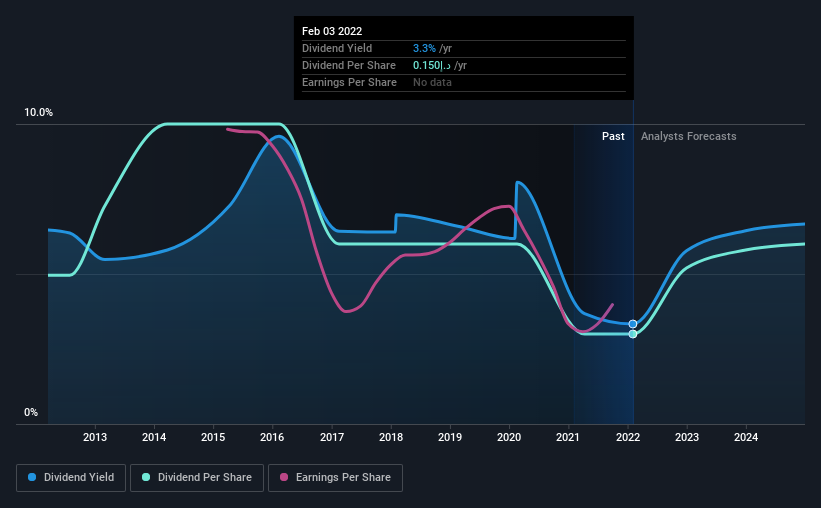- United Arab Emirates
- /
- Banks
- /
- ADX:RAKBANK
National Bank of Ras Al-Khaimah (P.S.C.) (ADX:RAKBANK) Is Increasing Its Dividend To د.إ0.23

The National Bank of Ras Al-Khaimah (P.S.C.) (ADX:RAKBANK) has announced that it will be increasing its dividend on the 1st of January to د.إ0.23, which will be 50% higher than last year. This takes the dividend yield from 3.3% to 5.0%, which shareholders will be pleased with.
See our latest analysis for National Bank of Ras Al-Khaimah (P.S.C.)
National Bank of Ras Al-Khaimah (P.S.C.)'s Payment Has Solid Earnings Coverage
While it is great to have a strong dividend yield, we should also consider whether the payment is sustainable. Based on the last payment, National Bank of Ras Al-Khaimah (P.S.C.)'s earnings were much higher than the dividend, but it wasn't converting those earnings into cash flow. Since a dividend means the company is paying out cash to investors, this could prove to be a problem in the future.
Over the next year, EPS is forecast to expand by 36.1%. If the dividend continues along recent trends, we estimate the payout ratio will be 39%, which is in the range that makes us comfortable with the sustainability of the dividend.

Dividend Volatility
The company's dividend history has been marked by instability, with at least 1 cut in the last 10 years. The first annual payment during the last 10 years was د.إ0.25 in 2012, and the most recent fiscal year payment was د.إ0.15. This works out to be a decline of approximately 4.9% per year over that time. Declining dividends isn't generally what we look for as they can indicate that the company is running into some challenges.
Dividend Growth May Be Hard To Come By
Growing earnings per share could be a mitigating factor when considering the past fluctuations in the dividend. National Bank of Ras Al-Khaimah (P.S.C.) has seen earnings per share falling at 7.1% per year over the last five years. If earnings continue declining, the company may have to make the difficult choice of reducing the dividend or even stopping it completely - the opposite of dividend growth. It's not all bad news though, as the earnings are predicted to rise over the next 12 months - we would just be a bit cautious until this can turn into a longer term trend.
National Bank of Ras Al-Khaimah (P.S.C.)'s Dividend Doesn't Look Sustainable
In summary, while it's always good to see the dividend being raised, we don't think National Bank of Ras Al-Khaimah (P.S.C.)'s payments are rock solid. While the low payout ratio is redeeming feature, this is offset by the minimal cash to cover the payments. We don't think National Bank of Ras Al-Khaimah (P.S.C.) is a great stock to add to your portfolio if income is your focus.
Market movements attest to how highly valued a consistent dividend policy is compared to one which is more unpredictable. Meanwhile, despite the importance of dividend payments, they are not the only factors our readers should know when assessing a company. To that end, National Bank of Ras Al-Khaimah (P.S.C.) has 2 warning signs (and 1 which shouldn't be ignored) we think you should know about. We have also put together a list of global stocks with a solid dividend.
If you're looking to trade National Bank of Ras Al-Khaimah (P.S.C.), open an account with the lowest-cost platform trusted by professionals, Interactive Brokers.
With clients in over 200 countries and territories, and access to 160 markets, IBKR lets you trade stocks, options, futures, forex, bonds and funds from a single integrated account.
Enjoy no hidden fees, no account minimums, and FX conversion rates as low as 0.03%, far better than what most brokers offer.
Sponsored ContentValuation is complex, but we're here to simplify it.
Discover if National Bank of Ras Al-Khaimah (P.S.C.) might be undervalued or overvalued with our detailed analysis, featuring fair value estimates, potential risks, dividends, insider trades, and its financial condition.
Access Free AnalysisHave feedback on this article? Concerned about the content? Get in touch with us directly. Alternatively, email editorial-team (at) simplywallst.com.
This article by Simply Wall St is general in nature. We provide commentary based on historical data and analyst forecasts only using an unbiased methodology and our articles are not intended to be financial advice. It does not constitute a recommendation to buy or sell any stock, and does not take account of your objectives, or your financial situation. We aim to bring you long-term focused analysis driven by fundamental data. Note that our analysis may not factor in the latest price-sensitive company announcements or qualitative material. Simply Wall St has no position in any stocks mentioned.
About ADX:RAKBANK
National Bank of Ras Al-Khaimah (P.S.C.)
Engages in providing retail, Islamic, and commercial banking products, and services to individuals and businesses in the United Arab Emirates.
Excellent balance sheet established dividend payer.
Market Insights
Community Narratives



